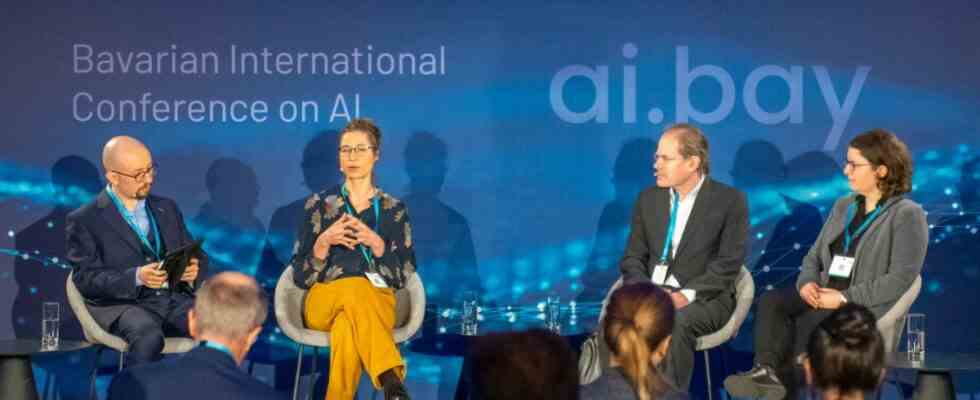The third digital revolution has begun. At least when it comes to Hinrich Schütze: “You can compare it well with the Internet or smartphones,” says the professor of computational linguistics from Munich’s Ludwig Maximilian University. Similar to these achievements, the artificial intelligence (AI) Chat GPT has its upsides and downsides. He speaks of so-called language models, which are currently not only electrifying technology fans. Chatbots like Chat GPT or Bard appear to people as equals who can talk about all topics. Mankind enters the year 2023 with the feeling of having contacted an alien form of intelligence.
Good timing for the AI Bay conference of the Bavarian state government in the Deutsches Museum in Munich. Schütze sits on the stage of the planetarium with two specialists and analyzes the revolution. He agrees on one thing with the computer linguists Barbara Plank from the LMU and Verena Rieser from the Heriot-Watt University in Edinburgh: when asked whether Chat GPT and its ilk are conscious, all three laugh and shake their heads. However, they address the biblical question of whether the new artificial intelligences are “Golems or Leviathan” – helpful assistants or uncontrollable monsters. Answer: both. “The way we write will change. We will always have an assistant,” says Schulze.
Verena Rieser builds voice programs herself and urges caution: “We could experience a Tesla moment. Years ago we also had high hopes for autonomous driving. But then so many ethical and safety issues arose.” According to her, the same should happen to the new chatbot: “I think it’s Pandora’s box.” Internet trolls with political motives are already likely to use language AIs to automatically generate propaganda. Such dangers would have to bring laws under control. However, Barbara Plank warns not to regulate AI out of fear of being dead. Bavaria’s Digital Minister Judith Gerlach made a similar statement at the conference. Planned EU rules would classify too many applications as “high risk”.
Researchers in Europe need to cooperate more, says an expert
The conference is intended to show that Prime Minister Markus Söder is serious about his high-tech agenda. Bavaria’s Prime Minister has 3.5 billion euros invested in research and companies, which should create 1000 technology professorships, among other things. His agenda puts Söder in a good mood. So much so that at the opening of the conference he exuberantly asked his interlocutor, the robot expert Sami Haddadin, whether his ministers could not be replaced by robots. Of course it’s just for fun. And all the more fun because three of these ministers sit in the front row right in front of Söder.
The AI specialists are less concerned with the security of their jobs than with the question of power: Open AI, the company behind Chat GPT, acts in a non-transparent manner, as does its competitor Google. You have no insight into the program code, says Barbara Plank: “We have to democratize the process so that scientists can access at least a fraction of the technical infrastructure that is available to large companies.” According to Rieser, if you can’t stand up to the Americans alone, researchers in Europe would have to cooperate more.
An American then presented the most sensational thing in the conference. Marc Raibert from Boston Dynamics demonstrated his company’s robotic dog. He stamped in the planetarium in such a way that the European soil vibrated.

